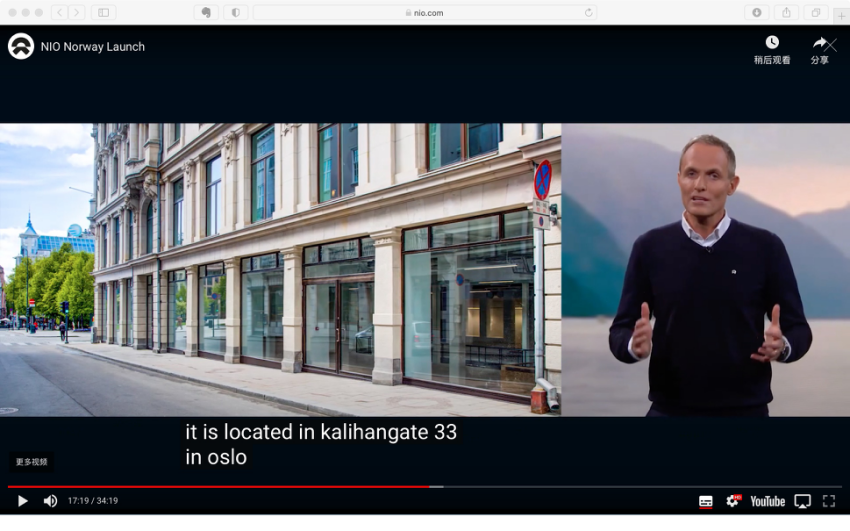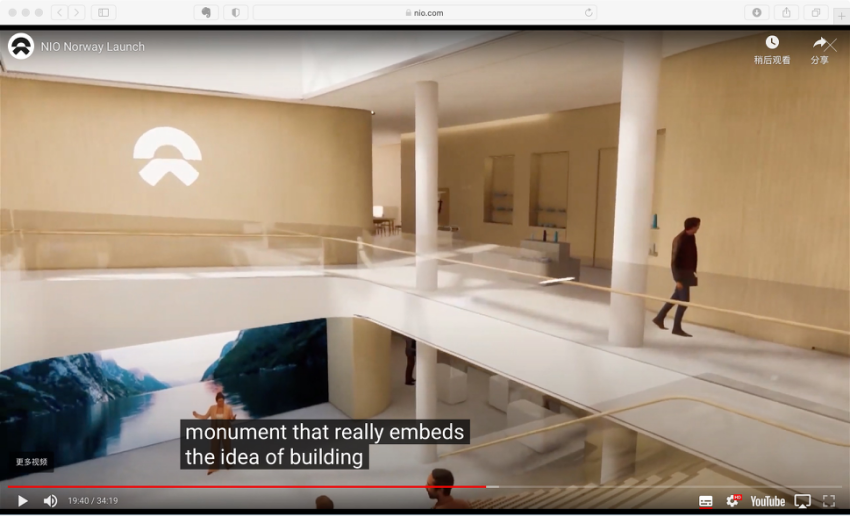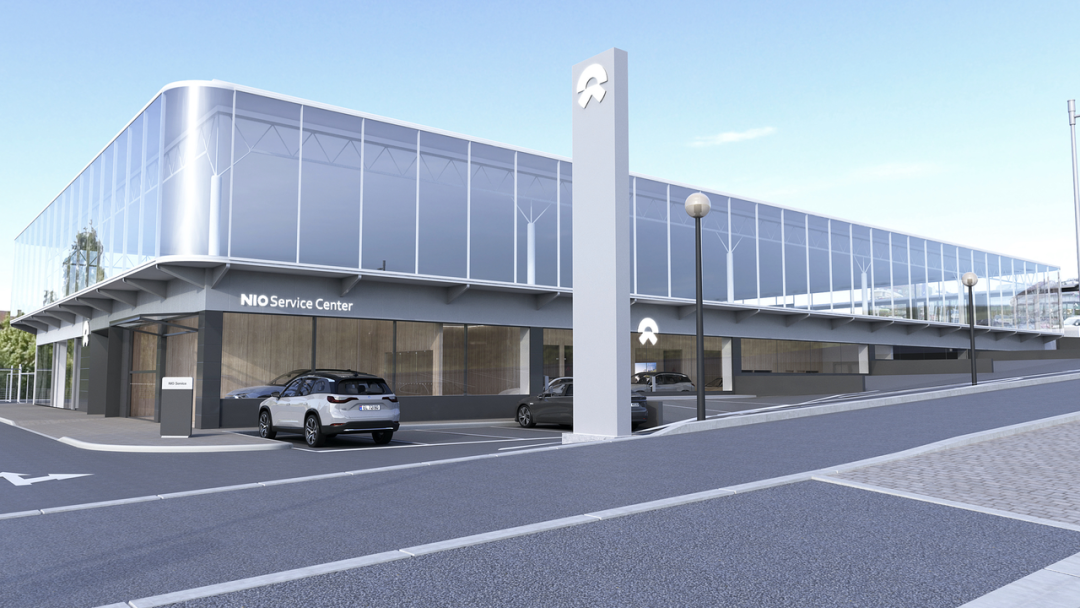*This article was reprinted from the Autocarweekly official account.
Author: Karakush
NIO has finally pushed its way into the global market.
This Chinese company, which has three design centers in the West and made a name for itself in New North and went public in New York, officially entered its first overseas market by releasing its Norwegian strategy on May 6.
Its global genes add up to the last deoxyribonucleic acid – a genuine international brand, which cannot be just about making money in RMB.

One World, One NIO
For new forces like NIO, it seems not that difficult to earn foreign exchange. Since last year, many rivals including Aiways, XPeng, and Seres have successively launched their European counterparts.
NIO is somewhat different. Instead of directly delivering products to local dealers, NIO did not forget the essence of brand culture and carried a set of user enterprise values and service operation systems and rushed toward the unarmed Norwegians.
It is still all self-built, all direct sales.

This includes its own sales network – the first NIO House will open on Karl Johans gate in Oslo in the third quarter.
This is a location equivalent to Beijing’s Chang’an Street, where NIO has contracted more than 2,000 square meters of grand storefront. The decoration maintains a familiar style, but from the live preview images, the Fjord Plan’s taste upgrade does not include any meat and becomes purely vegetarian.
Next year, NIO will also open four NIO Spaces in Bergen, Stavanger, Trondheim, and Kristiansand.

This also includes its own service operation – the first delivery center will also be equipped in Oslo and will open in September; by next year, after-sales service will cover the whole country.
Characteristics services, such as mobile service vehicles and door-to-door pickup and delivery services, will continue to be provided in Norway; however, in terms of execution details, they will be adjusted according to local conditions, scenarios, and habits. For example, a large number of manual services in China will become self-service in Norway. “The big starting point is the same.” Qin Lihong emphasized. It’s all about users, users, and users.
 NIO’s commitment to providing its users with superior service extends to developing its own recharging infrastructure – the second-generation power swap stations will be put into operation this year with 4 initial test stations, and a further 16 to be installed next year, while the European version of the charging map will also be available online. By 2022, NIO will lay down charging stations across five cities in Norway.
NIO’s commitment to providing its users with superior service extends to developing its own recharging infrastructure – the second-generation power swap stations will be put into operation this year with 4 initial test stations, and a further 16 to be installed next year, while the European version of the charging map will also be available online. By 2022, NIO will lay down charging stations across five cities in Norway.
With this material foundation, NIO’s BaaS model will blossom in Scandinavia, although issues like tax considerations are still subject to negotiation, offering benefits to users is imperative, and the universe won’t stand in the way.
The company’s user community is also an integral part of this commitment. The European version of the NIO App, complete with its commercial model, such as NIO Life and points system, is scheduled for release in the third quarter. The webpage is already available in English and Norwegian languages, where Norwegian users can place orders and await delivery in September.
This year, only the ES8 model will be delivered, followed by the introduction of a new car, the ET7, in the second half of next year. NIO sticks with the “top-down” strategy, a common strategy back home in China that has proven successful. The company has only these two car models currently planned, but further developments are possible.
The major difference is that this time, NIO will have inventory. As all manufacturing, including cars, power swap stations and even the NIO Life products, are exported locally from China, the supply chain will not be relocated for the time being. If this remains the same “Order-To-Delivery” model, the waiting time could test the patience of those eagerly anticipating their orders.
The world has waited too long for NIO.
A global brand from the start, NIO’s goal is to provide superior products and services to users worldwide. However, due to pandemic and other self-imposed challenges, NIO’s globalization plans were delayed. This year, with increased financial strength, NIO feels it is ready to take on the world. Starting with Norway, the company is taking a step not unexpected, given that the small northern country, with just over 5 million inhabitants, has the world’s highest sales of electric vehicles, accounting for 54.3% (according to Germany’s ZSW statistics).Its moderate size, its location in Europe, the local government’s determination to reduce emissions and policy incentives, and the absence of domestic automotive industry barriers, with friendly import tariffs… Norway is the perfect first market. Consequently, it has become the first stop for many Chinese new energy vehicles that overflow domestic markets.
For NIO, there are some additional advantages.
For instance, the market structure is relatively healthy. Compared to the widely-accepted small electric vehicles for the middle class on the European continent, Norway’s high-end car market is also quite impressive. Tesla and Audi e-tron both have offerings. After conducting research, NIO believes that the ES8’s competitiveness in the segmented market (including gasoline-powered cars, hybrids, and electric cars) is quite strong. We won’t say it’s a done deal, but this is a prepared foray.
More importantly, NIO’s founder, William Li, notes that Norwegian consumer consciousness and cultural atmospheres are very consistent with NIO’s values. This makes it more advantageous for NIO’s overall overseas expansion plan to be based on the ‘NIO ecological civilization’ that is founded on cars. They do not only want to sell cars; they want to establish a system that’s in many ways similar to what they’ve achieved domestically.
Compared to other peers’ dealership-leaping models, this progress is much slower and less effective. Truth be told, this, in fact, amplifies the cultural and localization difficulties that Chinese enterprises faced during their overseas expansions. I am very excited about, but also very skeptical whether the same passionate ‘NIO people’ can be developed within an exotic culture. Will they be willing to socialize with such fervor, charter planes to go dancing and/or singing karaoke, and grow alongside this young brand without fear of sacrifice?
But, is NIO still NIO if there are no devoted fans? This is a very interesting question, and we will undoubtedly get the answer. These days, there is a foreign friend named Marius Hayler on NIO’s app; he is the CEO of NIO Norway, and with the help of translation, he is experiencing the uniqueness of the “NIO WORLD.” At the same time, NIO is contemplating important minor issues such as “how is the exchange rate of points calculated.”
Try it out. After all, isn’t NIO gradually validated step by step?
But in NIO’s view, “there must be challenges ahead, but they are not as difficult for us as we imagine.” Qin Lihong said, “overcoming cultural conflicts is just a matter of following local cultures. So you give up some of your previous beliefs, and that’s about it.”NIO is a company of a laid-back attitude towards life. With 41 regional companies in China, they have a strong sense of autonomy. This quality only becomes more prominent when it comes to breaking into overseas markets. “Nowadays, it’s not much different from when Li Bin and I were chatting about how to sell cars in Northeast China. We have a simple philosophy: a good product will be welcomed by people all over the world.”
When it comes to product compliance, NIO’s vehicles are designed to meet local crash standards from the beginning of the design and engineering process. The only adjustments made are usually related to charging ports and tow hooks. Additionally, regarding software, besides language versions, more local data is needed for smart, assisted-driving support.
Li Bin and Qin Lihong didn’t want to express too much overt optimism when it comes to the performance of the Norwegian team. “We have no expectations for the Norwegian team,” Li Bin even said.
They probably have small goals in mind secretly but we wouldn’t know, and they wouldn’t say. They mentioned something like: “This is just planting seeds in one place, hoping not to expect the seeds to grow into a tree immediately. Any such hope will end badly…” and other things, maintaining their usual tactical low expectation posture.
They don’t expect to make money off the carbon market. “Carbon emissions trading does not require planning, and it is done with respect for the rules. Naturally, there will be results as sales increase.”
They don’t expect to reap much profit by taking advantage of capitalism. “Different countries will have different prices. Pricing takes tariffs and shipping costs into consideration. The general principles are about the same. Profit margins aren’t particularly taken into account compared to China, whether they’re higher or lower.”
They are even prepared to lose money. Entering Europe means more losses and some financial pressure. However, compared to the company’s absolute amount, it is relatively low. “It’s like going into several more prefecture-level cities in China,” Qin Lihong said.
After all, “the pursuit of profit is something that only companies that have not yet grown will focus on. We still have to develop, and there is still a lot of room for development.”
Of course, we cannot interpret such political correctness so directly. Humility is just his protective color, and underneath is pride.
“If things are done well and the market develops, we will certainly be able to share considerable benefits.” Although they don’t care about goals, “we still care very much about how well it was cultivated and want to solidly do it.”
In summary, it may be “meticulous preparation, patience, long-term planning.”
“This twelve-character maxim has been mentioned at least four times during group interviews today.”How far away is it? Li Bin said that it will take five to ten years to look back and see the significance of this press conference.
And this is also true for NIO itself.
In Li Bin’s plan, NIO will still be in the qualification stage before 2024, and they don’t think they have a guaranteed ticket to the finals today. “I don’t think I’m ahead. It’s meaningless to say that you are ahead for a while.” Li Bin believes that 2024 may be a node where some conclusions can be drawn.
This is also true for the world. It seems inappropriate to talk about “globalization” today, as if it is a pseudo-proposition that will inevitably fall apart. Even without natural disasters, man-made disasters can break the connections within the global community.
But Qin Lihong pointed out that NIO is making cars and has found two obvious characteristics: one, this is not a game where the winner takes all; two, cars are actually naturally global products, but every company has different demands for globalization. No country can shut its doors to make cars. The epidemic can fully prove this point. When one is in trouble, the others cannot produce.
“At present, globalization is facing challenges from the epidemic and politics, but looking further, we still have confidence.” Li Bin said. He recently began rereading “The Clash of Civilizations,” an obsolete theory that is actually providing some pessimistic explanations for the world order.
However, “humanity will return to overall rationality. Although we are not naive enough to think that the conditions are as good as they were ten years ago, it is still an order of magnitude more difficult for a company from a Chinese background to go to foreign markets.”
Hope in humanity.
This is an industrial belief and also an open perspective. I hope that looking back in five to ten years, we will feel that this is a self-proving of China’s industrial curve overtaking, a disclosure of not wasting time, money, and manpower, and a beginning of the world recognizing and sharing the fruits of this revolution.
This article is a translation by ChatGPT of a Chinese report from 42HOW. If you have any questions about it, please email bd@42how.com.